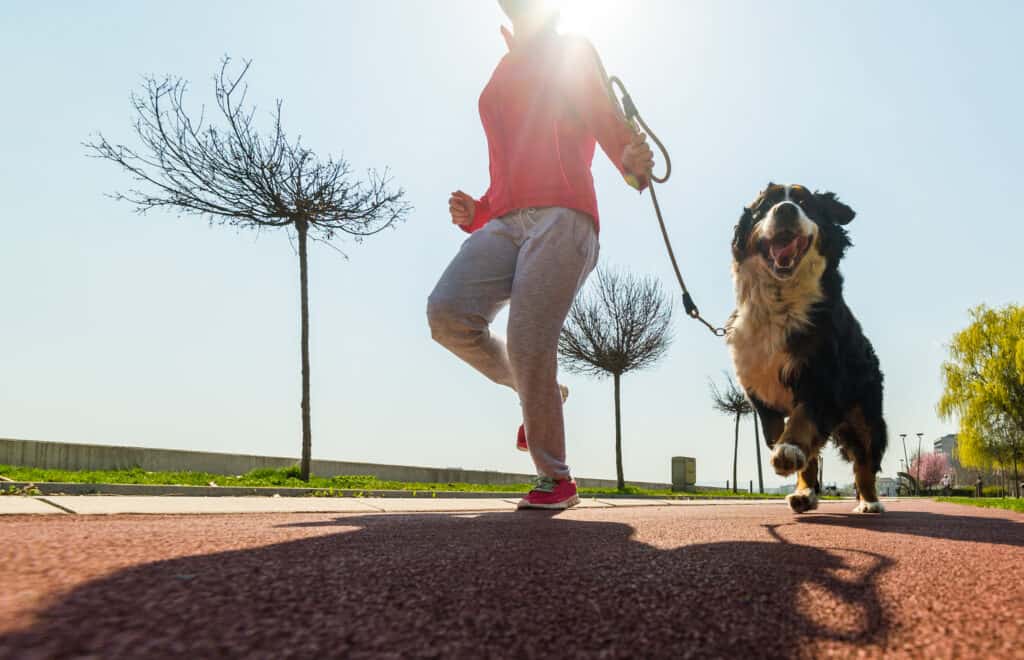The Bernese mountain dog is not just strikingly beautiful and hefty, but also generous with affection. Although they’re eager to please, they need your mindful, intentional help during the first year of their lives. From early socialization to obedience training, there are certain actions you need to take to set your Berner up for a life well lived. In a way, Berners train you too, so it’s a reciprocal endeavor. Discover how to train your Bernese mountain dog with these best methods and tips!
How to Train Your Bernese Mountain Dog: The 8 Best Methods and Tips
1. Puppy Time!
Bringing a new puppy home is an exciting venture. However, this is not the type of decision you make lightly or based solely on emotion. These dogs are hefty, growing to weigh between 70 and 115 pounds on average. They require special care, proper grooming, nutritious food, and veterinary care throughout their entire lives. This isn’t just a dog you own; it’s a dog you advocate for. Before you bring a Berner home, get familiar with the breed, set up a wellness exam with your veterinarian, and call ahead to set up training classes for your new pup.
2. Early Socialization Is a Must
Early in your puppy’s life, they need to go through a series of vaccinations. Once they have received all necessary vaccinations, start socializing your pup. This isn’t just about introducing your puppy to other family members or other pets in the home, it’s also about getting out of the house and getting them acquainted with different sights, sounds, and scents. Visit your local dog-friendly stores like Michael’s or Petsmart. This is not the time to get cozy at home and isolate your pup. This is the time for them to get to know what the world is like.
3. Next: Housetraining!

Your Berner needs extra support and patience during the first six months of housetraining.
©Dora Zett/Shutterstock.com
Your Berner doesn’t acquire bladder strength until they’re half a year old. Those first six months can be a little challenging but it’s important to praise your pup when they go potty outside and to be patient if they have accidents inside. Experts warn against using pee pads inside the home because it can send a mixed message and your Berner may think that it’s okay to go inside. Instead, set up a schedule. Let them out every morning, for example. This way, your Berner develops a sense of routine and understands when (and where) it’s okay to go potty.
4. Work on Obedience Training
After your puppy is properly vaccinated, you should start obedience training. By this point, you should have already conducted research and connected with a trainer to set up these classes. The trainer will help your pup control impulses and will help you better control your pup, offer reassurance, and deal with pulling on the leash. If obedience training is not part of your Berner’s early experience, you’re likely to have a pup that can be an inadvertent danger to children, elderly people, and even other pets. Instead of letting these crucial weeks fly by without intentional training, set your Berner up for success.
5. Prep for Shedding Season
Unlike cats, dogs don’t meticulously groom themselves. They also spend more time outdoors and can pick up a lot of dirt and mud. To keep your Berner healthy and happy, make sure that you are either grooming them yourself or taking them to a reputable groomer. Not only should you bathe your puppy approximately every two months, but you should also trim their nails, and be aware of shedding season. This way, you can give your pup a good bath when it starts, clear out the dead coat, and then bathe them again in three weeks so that they don’t experience dryness and itchiness. When you know what to expect, you can treat your Berner with grace.
6. Light Exercise

Wait until your Berner is at least 15 months old before trying out strenuous exercise.
©iStock.com/Dogfest sponsors a 5K race, for the stalwart, as well as 1/2 mile and 1 mile fun runs
Puppies have a lot of energy. They need plenty of exercise and training during their first year. When they’re only a couple of weeks old, you should let them set the pace when you go out for a walk. You can lure them forward by praising them or offering them some goodies. Keep your dog active with regular walks but don’t expect them to perform strenuous physical activity. Give them a full 15 months of life before increasing their daily exercise (up to four hours per day!).
7. Introduce Swimming
At four months of age, your Berner is ready for swimming (so long as the weather allows for it!). This is the type of activity your puppy will relish — or absolutely abhor. However, your pup must learn how to swim in case they’re ever caught in water. Hop in with them and support them in the water as they paddle and make sense of the activity. Don’t just assume your puppy will be able to swim. Teach them.
8. Know When to Spay/Neuter
Although it’s typical for owners to spay and neuter their pups at six months of age, experts like Julie Jackson, who owns RavenRidge Bernese Mountain Dog, suggest waiting until they’re at least two years old. Work with your veterinarian and your breeder to determine the optimal time to move forward with either of these surgeries.
The photo featured at the top of this post is © Hugo Grajales/ via Getty Images
Ready to discover the top 10 cutest dog breeds in the entire world?
How about the fastest dogs, the largest dogs and those that are -- quite frankly -- just the kindest dogs on the planet? Each day, AZ Animals sends out lists just like this to our thousands of email subscribers. And the best part? It's FREE. Join today by entering your email below.
Thank you for reading! Have some feedback for us? Contact the AZ Animals editorial team.







